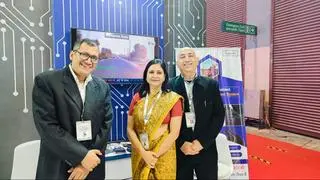At a time when most e-commerce companies are bleeding after having raised huge sums from investors, the Chennai-based eShakti.com Pvt Ltd has built a global brand in custom-made women’s clothing, selling to the US and Australia, without too much of investor money, has now broken even and is on the path to profitability.
eShakti has raised just $13 million (₹70 crore) from investors, when other online retailers have raised much more. It will end this financial year with a turnover of about ₹100 crore and is close to being profitable. After establishing itself in the US, one of the most competitive markets, over the last four years, it started selling in Australia in October 2016 and will shortly enter the UK and Germany.
Ask BG Krishnan, Founder and CEO, eShakti.com, about it, and he tells you in measured tones how it was a conscious decision to be viable as a business and how it had built strong competitive barriers. What were these, you ask him. “We had a value proposition that was unique and there was a strong felt need in the market that we were meeting. It was not simply saying instead of buying offline, buy online. We are not just moving the business from offline to online. Nobody is offering this service – customised clothing, made to your size, made to your style, made to your height. We are doing that internationally,” he explains.
Secret behind the successMore importantly, every dollar that eShakti spends on advertising more than earns its return within a short period. Its customers are its best advertisers, especially on Facebook, responding to questions from potential buyers and even endorsing the products, says Krishnan. eShakti’s strength, according to him, is that its customers are its drumbeaters; they bring in new customers.
Normally, he says, an advertisement creates an awareness, but in this case even comprehension happens thanks to his customers and he is not even paying for it. Due to this, the company’s advertising efficiencies are extremely high and “we are almost recovering the entire advertising cost in the first order itself.” Even when it launched its range in Australia, eShakti realised huge efficiencies for its advertising dollar.
“Our repeat customers are covering our overheads. Our new customers’ costs are being covered by the margins we make. That is how we are on the verge of profitability,” he explains. All this must be music to the ears of investors, especially since eShakti is looking to raise $20-25 million (₹130-160 crore). The fund raise will serve three purposes – new products, which means new designers and new fabric; new customers, which will be in the US first; and, then entering new markets.
He points out that the building blocks of his business – clothes styled to suit individual sizes and fit, custom-made and contemporary design – have not changed in the US since eShakti launched its range there. In the last four years, it has shipped about a million garments to the US, making it the largest custom-clothing company online. It ships about 2,000 garments a month to Australia and is already profitable there, according to Krishnan.
Initially, Krishnan admits, he was hesitant to go and open up a new market without having the customer service in place. But, the courier company that eShakti deals with, agreed to provide that service in Australia, especially in case any customer wanted to return a garment. Previously, says Krishnan, if a company were to create a brand in a new market, it would have to set apart quite a substantial sum of money. Now, thanks to Facebook, eShakti was able to do this at $100-200 a day and it comes at a cost per click. It was able to watch the response to its advertising and respond accordingly.
Zero-inventory modelUnlike other garment retailers, eShakti does not hold any inventory of stock and hence it is not burdened with holding cost. Since it makes customised-clothes, it has zero inventory. It promises delivery within 14 days of an order being placed, but most often is able to fulfil the order within 10 days. Its designs and styles are contemporary as the company regularly attends the major fashion shows. However, unlike other exporters, eShakti does not have to get the stocks well in advance for the oncoming season.
“I make the first garment, shoot it, show it. It is a zero-inventory company, so my working capital utilisation and the operating cycle are extremely efficient. That is one of the reasons I am able to manage with less capital,” he says.
eShakti has its operations split between Chennai, where it is headquartered, and Gurgaon, where it outsources stitching of its clothes, and New York, where its design team sits.
Krishnan says he is looking at whether he can crowd-source designers, thanks to the internet that allows for disintermediation. He has one designer in San Francisco and if the clothes she designs sell, she gets paid. This is what he is looking to do with designers elsewhere.
According to him, he would like to use the fresh funds for a research and development department. “I would like to see what kind of developments are there in Artificial Intelligence and robotics,” he says.








Comments
Comments have to be in English, and in full sentences. They cannot be abusive or personal. Please abide by our community guidelines for posting your comments.
We have migrated to a new commenting platform. If you are already a registered user of TheHindu Businessline and logged in, you may continue to engage with our articles. If you do not have an account please register and login to post comments. Users can access their older comments by logging into their accounts on Vuukle.